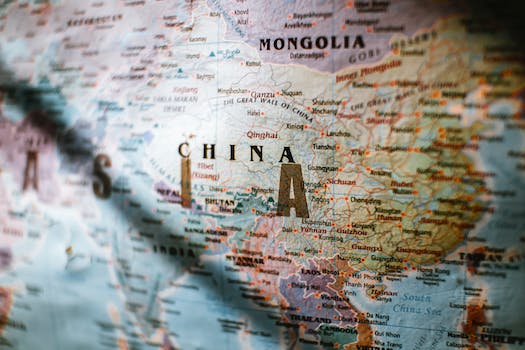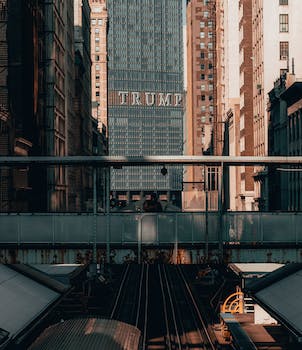

-
Table of Contents
Unveiling the dynamics of Political Capitalism in South Korea.
Introduction
In this second part of exploring political capitalism in South Korea, we will delve deeper into the intricate relationship between politics and capitalism in the country. By examining key historical events, economic policies, and the role of chaebols, we aim to gain a comprehensive understanding of how political capitalism has shaped South Korea's economic landscape.
The Influence of Chaebols on South Korean Political Capitalism
Exploring Political Capitalism in South Korea (Part 2)
The Influence of Chaebols on South Korean Political Capitalism
In the previous article, we delved into the concept of political capitalism and its significance in South Korea. Today, we will focus on one of the key players in this system - the chaebols. These large, family-controlled conglomerates have played a crucial role in shaping the economic and political landscape of South Korea.
To understand the influence of chaebols on political capitalism, it is important to first examine their origins. Chaebols emerged in the aftermath of the Korean War, when the government sought to promote rapid industrialization and economic growth. These conglomerates were initially supported by the government through various means, such as preferential treatment in terms of access to credit and government contracts.
Over time, chaebols grew in size and power, becoming major players in the South Korean economy. They diversified their operations into various sectors, including electronics, automotive, and heavy industries. This expansion was facilitated by their close ties with the government, which provided them with favorable policies and protection from foreign competition.
The symbiotic relationship between chaebols and the government is a defining characteristic of political capitalism in South Korea. Chaebols have often been accused of exerting undue influence on the government, using their economic power to shape policies in their favor. This has led to concerns about the concentration of wealth and power in the hands of a few elite families.
One way in which chaebols have influenced the political system is through their extensive lobbying efforts. They have employed a range of tactics, including campaign contributions, hiring former government officials as consultants, and establishing close relationships with politicians. These activities have allowed chaebols to gain access to decision-makers and influence policy outcomes.
Another aspect of chaebol influence on political capitalism is their role in shaping the regulatory environment. Chaebols have been known to exploit loopholes in regulations and engage in practices that give them an unfair advantage over smaller competitors. This has led to calls for greater transparency and accountability in the business practices of chaebols.
Furthermore, chaebols have been accused of engaging in corrupt practices, such as bribery and embezzlement. These scandals have further eroded public trust in both the government and chaebols, leading to calls for reform. In recent years, there have been efforts to increase transparency and accountability in the relationship between chaebols and the government.
Despite the criticisms and challenges, chaebols continue to play a significant role in the South Korean economy. They are major employers, contributing to job creation and economic growth. Their global reach and competitiveness have also helped to position South Korea as a major player in the global market.
In conclusion, the influence of chaebols on political capitalism in South Korea cannot be underestimated. These conglomerates have shaped the economic and political landscape of the country, often through close ties with the government. While their influence has led to concerns about concentration of power and corruption, chaebols also contribute to economic growth and competitiveness. Moving forward, it is crucial to strike a balance between promoting economic development and ensuring transparency and accountability in the relationship between chaebols and the government.
The Role of Government Policies in Shaping Political Capitalism in South Korea

Exploring Political Capitalism in South Korea (Part 2)
The Role of Government Policies in Shaping Political Capitalism in South Korea
In the previous article, we delved into the concept of political capitalism and its relevance in South Korea. We discussed how political and economic elites collude to maintain their power and influence, often at the expense of the general public. In this article, we will explore the role of government policies in shaping political capitalism in South Korea.
Government policies play a crucial role in shaping the dynamics of political capitalism in any country, and South Korea is no exception. The government's ability to regulate and control various aspects of the economy can either reinforce or challenge the existing power structures.
One of the key ways in which government policies shape political capitalism in South Korea is through the allocation of resources. The government has the power to distribute resources, such as licenses, permits, and contracts, which are often sought after by businesses. These resources can be used as tools of patronage, allowing political elites to reward their supporters and maintain their influence.
Furthermore, the government's control over key industries and sectors of the economy also contributes to political capitalism. State-owned enterprises, known as chaebols, dominate sectors such as electronics, automotive, and shipbuilding. These chaebols have close ties to the government, with many of their top executives having served in high-ranking government positions. This symbiotic relationship between the government and chaebols allows for the consolidation of power and wealth among a select few.
Government policies also shape political capitalism through the regulation of labor and employment practices. South Korea has a long history of labor activism, with workers often demanding better wages and working conditions. However, the government has been criticized for its heavy-handed approach in dealing with labor unions, often siding with businesses and suppressing workers' rights. This allows for the perpetuation of exploitative labor practices, benefiting the political and economic elites.
Another aspect of government policies that contributes to political capitalism is the regulation of the media. The government has the power to control and manipulate the flow of information, ensuring that certain narratives are promoted while others are suppressed. This allows political elites to shape public opinion and maintain their grip on power. Journalists and media outlets that challenge the status quo often face harassment and censorship, further consolidating the power of the ruling class.
However, it is important to note that government policies can also be a force for change and challenge political capitalism. In recent years, there have been efforts to address the issues of corruption and collusion between political and economic elites. The government has implemented anti-corruption measures and increased transparency in the allocation of resources. These policies aim to level the playing field and reduce the influence of political capitalism.
In conclusion, government policies play a significant role in shaping political capitalism in South Korea. The allocation of resources, control over key industries, regulation of labor practices, and manipulation of the media all contribute to the consolidation of power and wealth among a select few. However, there are also efforts to challenge political capitalism and promote transparency and accountability. The future of political capitalism in South Korea will depend on the balance between these opposing forces and the willingness of the government to address the concerns of the general public.
Corruption and Cronyism in South Korean Political Capitalism
Corruption and Cronyism in South Korean Political Capitalism
In the previous article, we delved into the concept of political capitalism and its prevalence in South Korea. Today, we will explore a darker side of this system: corruption and cronyism. These two elements have long plagued the country's political landscape, hindering its progress and undermining public trust.
Corruption, in its various forms, has been a persistent issue in South Korea. From bribery to embezzlement, politicians and government officials have been involved in numerous scandals over the years. These corrupt practices not only undermine the integrity of the political system but also divert public resources away from their intended purposes.
One of the most infamous corruption cases in South Korea's recent history is the Choi Soon-sil scandal. Choi, a close confidante of former President Park Geun-hye, was found guilty of using her influence to extort money from major corporations. This scandal not only led to Park's impeachment but also exposed the deep-rooted connections between politicians and business elites.
Cronyism, on the other hand, refers to the practice of favoring close associates or family members in political appointments or business deals. This nepotistic behavior has been a recurring theme in South Korean politics, where influential figures often use their power to benefit their inner circle.
The most notable example of cronyism in recent years is the case of Samsung's Lee Jae-yong. Lee, the heir to the Samsung empire, was convicted of bribery and corruption in connection with the Choi Soon-sil scandal. This case shed light on the cozy relationship between the government and big business, where favors and financial support were exchanged for political influence.
The consequences of corruption and cronyism are far-reaching. They erode public trust in the government and breed a sense of cynicism among the population. When people see their leaders engaging in corrupt practices, they lose faith in the system and become disillusioned with the idea of democracy.
Moreover, corruption and cronyism hinder economic growth and social development. When resources are misallocated or siphoned off for personal gain, the country as a whole suffers. This not only affects the economy but also exacerbates social inequalities, as those with connections and wealth continue to benefit at the expense of the majority.
Efforts to combat corruption and cronyism in South Korea have been ongoing. The country has established various anti-corruption agencies and enacted legislation to promote transparency and accountability. However, these measures alone are not enough to eradicate these deep-rooted issues.
To truly address corruption and cronyism, a cultural shift is needed. South Korean society must reject the notion that success and power can be achieved through illicit means. Education and awareness campaigns can play a crucial role in promoting ethical behavior and holding politicians accountable for their actions.
Furthermore, the media and civil society have a vital role to play in exposing corruption and cronyism. Investigative journalism and public pressure can help uncover wrongdoing and ensure that those responsible are held accountable. By shining a light on these issues, the public can demand change and push for a more transparent and fair political system.
In conclusion, corruption and cronyism continue to be significant challenges in South Korea's political capitalism system. These practices undermine public trust, hinder economic growth, and perpetuate social inequalities. To combat these issues, a multi-faceted approach is necessary, involving legal measures, cultural change, and an engaged civil society. Only through these collective efforts can South Korea move towards a more transparent and accountable political system.
Q&A
1. What is political capitalism?
Political capitalism refers to a system where political and economic power are intertwined, allowing politicians and business elites to collaborate for mutual benefit.
2. How does political capitalism manifest in South Korea?
In South Korea, political capitalism is characterized by close ties between politicians and business conglomerates (chaebols), leading to preferential treatment, corruption, and concentration of wealth and power.
3. What are the consequences of political capitalism in South Korea?
The consequences of political capitalism in South Korea include economic inequality, limited competition, lack of transparency, and a weakened democracy, as power becomes concentrated in the hands of a few influential individuals and corporations.
Conclusion
In conclusion, exploring political capitalism in South Korea reveals a complex and intertwined relationship between politics and business. The country's history of state-led development and close ties between government and conglomerates have shaped its economic landscape. While political capitalism has contributed to rapid economic growth, it has also led to issues such as corruption and inequality. Understanding and addressing these challenges is crucial for South Korea's future development and the promotion of a more inclusive and transparent economic system.












